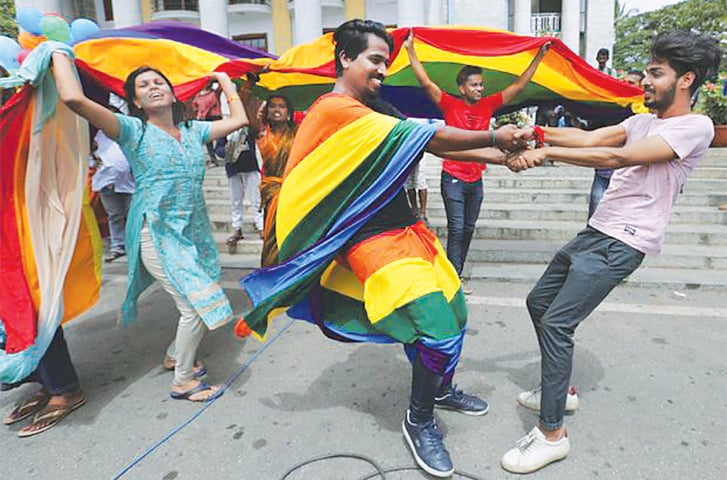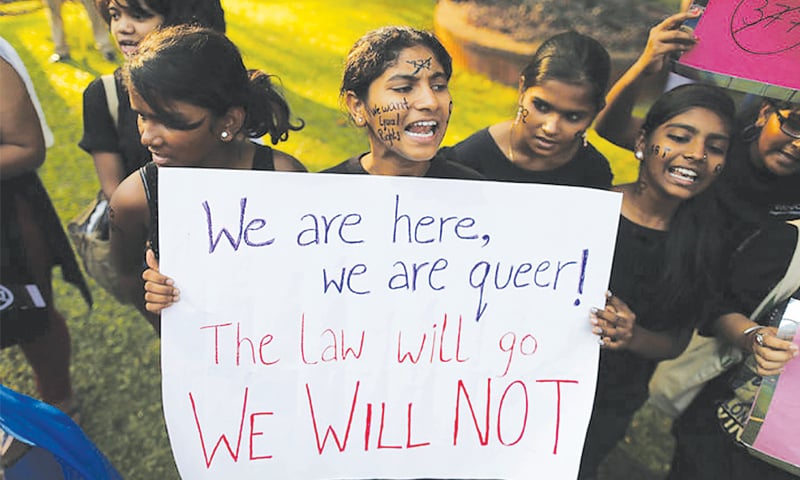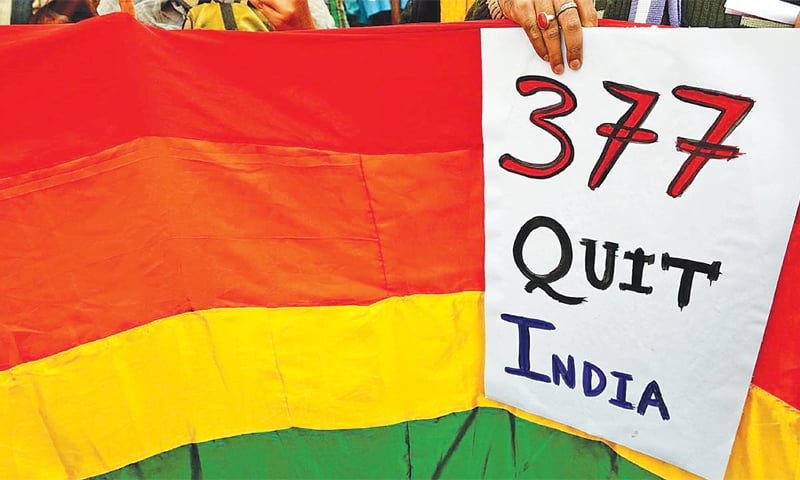On September 6, 2018, in a landmark unanimous judgment, a five-judge bench of the Indian Supreme Court ruled that Section 377 of the Indian Penal Code does not apply to “consensual sexual acts of adults” — including same-sex relations between consenting adults. The court ruled that the law was “irrational, indefensible and manifestly arbitrary”; and that discrimination based on sexual orientation was a violation of fundamental rights, such as, autonomy, privacy, equality, dignity, and non-discrimination guaranteed under the Indian Constitution as well as international laws, including the International Covenant on Civil and Political Rights (ICCPR).
Section 377 has long been a tool of oppression and discrimination used against the Indian queer community, and the Supreme Court’s verdict marks a momentous step forward for human rights in the country and beyond.
CONTEXT AND PROCEDURAL HISTORY
Section 377 was introduced in India through the colonial Indian Penal Code (IPC) in 1860, when India was still a British colony. The intent behind the provision was clearly to criminalise individuals whose real or imputed sexual relations the colonial rulers found to be “unnatural” and undesirable. The IPC was the template for penal legislation introduced in other British colonies as well and, as a result, several countries inherited some version of section 377 in their penal codes. The United Kingdom has since decriminalised same-sex relations, yet, several former colonies, including Pakistan, continue to grapple with the impact of such laws.
The Indian Supreme Court verdict on Section 377 has implications far beyond LGBT rights
This month’s judgment is the result of a long process of litigation going back more than a decade.
In a 2009 landmark judgment, the Delhi High Court in the case of Naz Foundation v. Government of NCT of Delhi ruled that Section 377 violated the Indian Constitution in so far as it criminalised consensual sexual acts between adults, as the provision discriminated on the basis of sexual orientation and violated equality, privacy, liberty and dignity, and relevant international human rights law standards.
However, Suresh Kumar Koushal, who was not an original party to the original proceedings before the Delhi High Court was nonetheless permitted to bring proceedings against the Naz judgment to the Supreme Court. In December 2013, Koushal’s appeal resulted in India’s Supreme Court reversing the Delhi High Court’s decision and ruling that it was ultimately for the legislature to decide whether to repeal Section 377.
This led the original petitioners in the Naz case, as well as the central government, to file review petitions against the December 2013 Supreme Court decision. However, these review petitions were dismissed on January 28, 2014, with the Supreme Court holding that it saw no reason to interfere with the December 2013 judgment.
The petitioners then filed “curative petitions” before the Supreme Court, which in India are rarely granted. However, in this case, the Supreme Court granted the curative petition on February 2, 2016, and passed an order to constitute a constitution bench to hear the curative petitions.
Soon after, a series of fresh petitions contesting the constitutional validity of Section 377 were also filed, with the first petition being Navtej Singh Johar v. Union of India, which was admitted on January 8, 2018, along with five other petitions which were also admitted and joined with Johar’s petition.

The judgment delivered on September 6, comprises four separate but concurring judgments, featuring partly different reasoning for reading down Section 377. Among the themes common to all four opinions are: arguments about “constitutional morality” and the protection of the rights of minority communities; the right to dignity; the rights to equality and non-discrimination; and the right to privacy.
CONSTITUTIONAL MORALITY
An underlying thread running through the judgment is that of “constitutional morality” and the role of the judiciary in upholding the principles enshrined in the Indian Constitution, as opposed to “popular” sentiment or majoritarian views.
This means that all institutions of the Indian State, including the judiciary, have the obligation to “preserve the heterogeneous nature of the society and to curb any attempt by the majority to usurp the rights and freedoms of a smaller or minuscule section of the populace.”
The judgment noted that “constitutional morality” contains a number of principles, including “espousal of a pluralistic and inclusive society.” This means that all institutions of the Indian State, including the judiciary, have the obligation to “preserve the heterogeneous nature of the society and to curb any attempt by the majority to usurp the rights and freedoms of a smaller or minuscule section of the populace.”
As held in the judgment, “any attempt to push and shove a homogeneous, uniform, consistent and a standardised philosophy throughout the society would violate the principle of constitutional morality.”
In light of the above, the court reasoned that it is necessary for constitutional courts to include in their judicial interpretation a “sense of constitutional morality” so that they, the judges — with the help of “judicial creativity” where required — are able to fulfil their foremost constitutional obligation to protect the rights granted to the people by the constitution.

The idea that minority populations and communities must be protected against majoritarian tendencies is expressed throughout the judgment. The Indian Supreme Court repeatedly observes that minorities face grave dangers of discrimination for the simple reason that their views, beliefs or way of life does not accord with the “mainstream,” but in a democracy founded on the rule of law, it does not mean that their rights are any less sacred than those conferred on others.
RIGHT TO DIGNITY
The Indian Supreme Court noted that the right to live with dignity is recognised as a human right under international standards, including the ICCPR, and Indian courts, too, have recognised “human dignity” as an important aspect of the right to life under Article 21 of the Indian Constitution (i.e, the right to life).
Therefore, constitutional courts have a duty to protect the dignity of every individual, for “without the right to dignity, every other right would be rendered meaningless.”
The Supreme Court went on to clarify that the concept of dignity is relevant in the context of Section 377 of the IPC as the provision encroaches upon the right to dignity of a “severely deprived section of our society.” The court acknowledged that the choice of individuals to engage in certain acts within their private sphere has been restricted by criminalising the same on account of an “age-old social perception”, and that controlling or restricting such an essential decision about one’s sexual orientation, which is integral to the identity of a person, by “tainting it with criminality” would violate people’s right to dignity by reducing it to “mere letters without any spirit.”
RIGHT TO EQUALITY AND NON-DISCRIMINATION
The court also agreed with the petitioners’ argument that Section 377 violates LGBT persons’ “right to equality before the law”, “equal protection of the laws”, and non-discrimination under Articles 14 and 15 of the constitution, as well as Article 26 of the ICCPR.
In reaching this conclusion, the court held that Section 377’s qualification of consensual same-sex relations as being “against the order of nature”, is not “reasonable” or based upon “intelligible differentia” as it discriminates on the basis of an “intrinsic and core trait of an individual” — their sexual orientation.
Furthermore, the court said that while the language of Section 377 is seemingly neutral, in effect, it impacts the LGBT community disproportionately and therefore is discriminatory. In doing so, the Supreme Court explicitly recognised the concept of “indirect discrimination”, where laws that are apparently “neutral” like Section 377 but nonetheless have a disproportionate impact upon a segment of the population because of the broader social context within which law is embedded.

Finally, the Supreme Court also observed that Section 377 is discriminatory because it criminalises behavior that does not conform to the heterosexual expectations of society. In doing so it perpetuates a “symbiotic relationship between anti-homosexual legislation and traditional gender roles,” as it gives people ammunition to say “this is what a man is” as the law — Section 377 — says “this is what a man is not.”
RIGHT TO PRIVACY
In August 2017, in Justice K.S. Puttaswamy v. Union of India, the Supreme Court had delivered another landmark judgment that guaranteed the constitutional right to privacy, and referred to sexual orientation as a core component of privacy.
The five-member bench on Johar relied heavily on the reasoning in the Puttaswamy case to reaffirm that the right to privacy is intrinsic to liberty, central to human dignity and the core of autonomy, which are integral to the right to life under Article 21 of the constitution.
The Court further observed that “a meaningful life is a life of freedom and self-respect and nurtured in the ability to decide the course of living” and, naturally, this includes making decisions about one’s relationships — physical, mental, sexual or emotional. The constitution protects the realisation of this basic right to companionship, “so long as such a companionship is consensual, free from the vice of deceit, force, coercion and does not result in violation of the fundamental rights of others.”
IMPACT BEYOND INDIA
As discussed earlier, Section 377 is a relic of the British colonial penal code and is replicated in several former British colonies even though it was finally repealed in Northern Ireland in 1982, following repeals in Scotland in 1980 and England and Wales in 1967.
There is, however, now a wave towards decriminalisation in the Commonwealth, including through judicial pronouncements. For example, in 2016, the Supreme Court of Belize and, in 2018, the High Court of Justice in Trinidad and Tobago, held legislation that criminalised same-sex relations to be in violation of the rights to equality, dignity and privacy. And now, particularly because jurisprudence of the Indian Supreme Court is considered a persuasive precedent throughout the Commonwealth, the Navtej Singh Johar judgment could inspire other states to follow suit.
Through this judgment, the Indian Supreme Court has once again shown the critical role of the judiciary to affirm human rights and equality, and to protect minority communities against the “tyranny of the majority” —something courts in the region, including Pakistan, have in many instances failed to uphold.
The writer is a legal adviser for the International Commission of Jurists.
reema.omer@icj.org
Published in Dawn, EOS, September 23rd, 2018















































